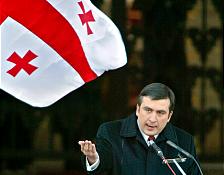
SAAKASHVILI AT UN: INTERNATIONAL ORGANIZATIONS FAILING ON POST-SOVIET CONFLICT RESOLUTION
Publication: Eurasia Daily Monitor Volume: 4 Issue: 181
By:

Addressing the UN General Assembly in New York on September 26, Georgian President Mikheil Saakashvili cautioned the United Nations and other international institutions that their credibility is eroding as security actors and guardians of international law. Saakashvili noted that the United Nations and the OSCE were failing in Abkhazia and South Ossetia, respectively, to contribute to peaceful resolution of those conflicts after more than a decade. Observing that not a single in-depth analysis was ever conducted about this record of failure, he called for a “comprehensive review of all aspects of the peace process” that should result in “fundamental change” to the existing “mediation” and “peacekeeping” formats.
Without specifically naming Russia as creator and monopolist leader of those formats, Saakashvili pointed to the “years of biased and unbalanced actions by the supposedly peacekeeping forces” and called for replacing them with “competent and neutral ones, to engage in peace-building, rather than maintain the existing situation.” He named the return of Georgians expelled from Abkhazia (“internally displaced persons”) back to their homes as a key task of genuine peacekeeping and called on the UN to draft a “meaningful and implementable plan” toward that goal (previous UN proposals in that regard were largely subject to Russian-backed Abkhaz vetoes).
Noting the emergence of Tbilisi-backed alternative authorities in South Ossetia, Saakashvili called on international organizations to “seize this opportunity” for peaceful resolution of the conflict. The movement and provisional authority led by Dmitry Sanakoyev represent local interests against the “elements of Russia’s security services” in the secessionist authorities there. Regarding Abkhazia, Saakashvili offered — and asked the UN to support — direct dialogue between Tbilisi and Sukhumi, “without involvement by parties that oppose direct dialogue” and without preconditions. The call for direct dialogue responds to the chronic failure of the Russian-controlled “multilateral” format, through which Moscow blocks a Tbilisi-Sukhumi direct dialogue. The urge to remove preconditions refers to Sukhumi’s Moscow-backed demand that Georgia withdraw its civil authorities and police from Upper Abkhazia.
Saakashvili spelled out Georgia’s political offer to the Abkhaz and South Ossetian communities: “Full self-governance based on the same principles that have guided Europe,” with special protection of language and minority rights, under Georgian constitutional guarantees as well as international guarantees to be negotiated. He also linked the long-term preservation of ethnic identity with legal guarantees of property rights. The unspoken implication is that property guarantees under Georgian law could forestall the possibility of massive Russian settlement on seafront properties in Abkhazia, where the Abkhaz themselves could be reduced to a small minority. This eventuality is known to preoccupy many Abkhaz, and seems increasingly likely unless Georgian law is restored to guarantee indigenous property rights there.
On top of those chronic issues, two most recent developments are shaping the ongoing debate on conflict-resolution. In South Ossetia, Russian forces are building a military base at Java, situated between Tskhinvali and the Roki tunnel, which funnels Russian weaponry illegally into South Ossetia. The OSCE observers, who are dedicated but pathetically few and under-equipped, cannot comment, much less react, because their patrolling and observation is limited to a 15-kilometer range around Tskhinvali, short of Java. That locality is the site of a former Soviet, then Russian helicopter base. The build-up there provides cause for inspection under the Treaty on Conventional Forces in Europe, which Russia wants immediately ratified even as it breaches it.
In Abkhazia, the Russian military on September 20 led a mainly Abkhaz armed group into Georgian-controlled territory for reasons that are being investigated. Intercepted by Georgian interior troops, the intruding group fired and lost two members, including the commander who turned out to be a Russian Lt.-Colonel; another 10 are in Georgian custody. The Russian government claimed that the officer was in command of an “anti-terrorist” training center in Abkhazia, but did not explain why the group was raiding Georgian territory in Upper Abkhazia.
In many ways, Saakashvili’s analysis of the international organizations’ failure in Abkhazia and South Ossetia is applicable to the conflicts in Transnistria and Karabakh as well. The GUAM group of countries (Georgia, Ukraine, Azerbaijan, Moldova) drafted last year a joint document on the unresolved conflict on their territories, to be submitted to the UN General Assembly’s 2006-2007 session for debate. In the event it was not submitted, partly because certain Western chancelleries dissuaded the GUAM group from this move. These chancelleries apparently felt uncomfortable with the document’s emphasis on the territorial integrity of states at the time when most Western governments support (albeit in varying degrees) the independence of Kosovo from Serbia. However, this logic seems tacitly to accept Moscow’s thesis that the post-Soviet conflicts and Kosovo conflict are linked — a thesis completely rejected officially by the United States and the European Union. Any tacit or implicit acceptance of linkage could reward Moscow’s tactics of blocking the resolution of all five conflicts. To demonstrate the rejection of linkage and dispel any equivocation, the GUAM group ought to be encouraged to submit their collective document to the General Assembly during this session.
(Civil Georgia, The Messenger, September 27-28)




